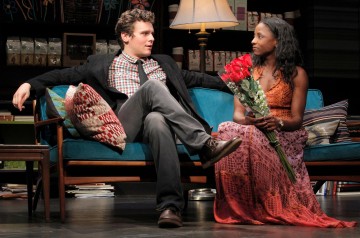Twice in a row now, Jonathan Groff has played a troubled writer. Last year in Deathtrap, his character struggled to take credit for a screenplay that he’d written – at all costs. This time around, he’s playing a writer who doesn’t actually want credit for a brilliant play he’s written. Why? Because he’s white.
The play, as it turns out, tells the story of a black family, and Danny Larsen (Groff), doesn’t think the play will get the attention it deserves if its author is perceived to be something other than black. When the play is selected for a prestigious festival – under a deceiving name – Larsen hires a black actress to pretend to be him. And then we all learn important things about bigotry and human nature. Naturally.
I think, at some point, we’re also supposed to ponder whether bigotry, even when it’s aimed at different groups of people, is essentially all the same. Larsen is gay, and he and the actress, Emilie, trade barbs about the history of oppression from the moment the ruse begins.
The Submission, which opened last week at MCC Theatre, is the prizewinning creation of Jeff Talbott, the first-ever recipient of the Laurents-Hatcher Award – a playwriting prize named for the late Arthur Laurents and his partner. Watching the play, however, you will wonder if Talbott really wrote it. The play does a good job, at least, of planting doubt about authenticity and authorship in the audience’s mind. At other things, it’s not so successful.
For a show that’s searching so hard to say something important about authenticity, the show feels weirdly… inauthentic. It seems impossible that a serious playwright would ever take such a risk – or would take the charade as far as Larsen does without being discovered. As the situation deepens, the characters’ confrontations become more heated and outrageous. They eventually culminate into some ugly insult-hurling, leaving the audience to wonder: Who would ever say these things? Who would this ever happen to, besides the crazy people on this stage who apparently think this is some semblance of real life? The words they use – distinctly taboo ones, in case you’re wondering – seem chosen by the author simply because he thinks they’re “bad” words that need saying aloud, and not because they work in service of the story.
And what of the show’s insinuation that reverse-racism, or a plague of cultural misunderstanding – at the very least – is somehow keeping the world from seeing all kinds of great art? That just seems… like not-real life.
Tasked with playing a singularly awful character, Groff does a good job of capturing Larsen’s smarty-pants callowness. In general, the performances here are strong. Rutina Wesley, too, plays the actress Emilie as both convincingly indignant and vulnerable. Their bickering and shouting can be fun to watch. But the play happening around them doesn’t quite get where it’s aiming to go.



{ 0 comments… add one }